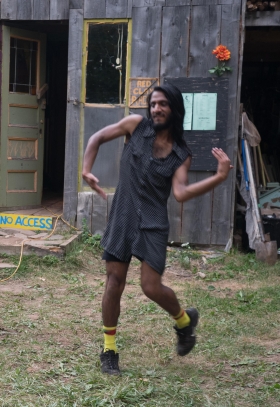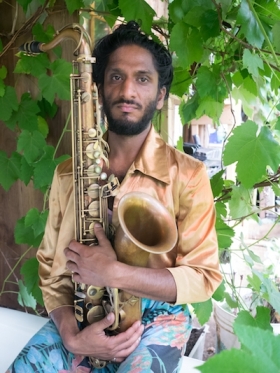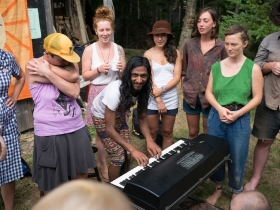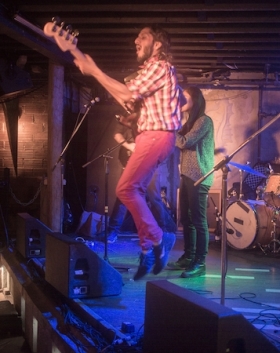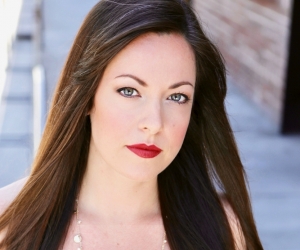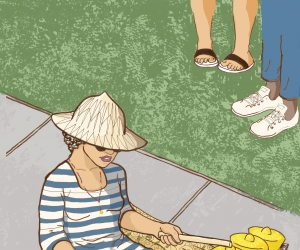IT'S A DREARY WINTER NIGHT IN TORONTO. It’s already super late—the last of four bands has already played, and the makeshift bar within the makeshift venue has been closed for a good half hour. Although things are winding down, a healthy crowd is hanging out, chatting, and enjoying the warm, dry indoors.
Suddenly, there’s a loud eruption of sound at the front of the room and a hush falls over the crowd, the mood a mixture of anticipation and mystification.
Nick Dourado is on stage amidst the cacophonous beats, and taking generous hauls from an enormous spliff. He’s the last person I expected to see up there. Cotton-mouthed audacity aside, he has already played (really played) in both of the visiting Haligonian bands on the bill. Yet here he is with more energy than anyone else in the room, flailing away, diving off the stage, and, between tokes, hollering maniacally through Auto-tune and various other effects. Even as I set out for home, BUDI, his rambunctious alter ego, is still going full tilt.
Even beyond antics or the effulgent hues of his wardrobe, it’s hard to miss Dourado. His total immersion in the act of listening and performing is always palpable, and this focus is a magnet for audiences.
BORN AND RAISED IN CALGARY, ALBERTA, Dourado forged a commitment to music early on. At age seven, he and his twin brother Charles plunged into a serious routine of piano lessons—twice weekly, each staying and observing the other’s hour-long lesson.
“Our teacher was a genius,” Dourado says, with his trademark sincere hyperbole. “She came from a deep tradition of playing the piano, so she knew how to inspire some pretty brain-dead kids.” Nevertheless, Dourado says his engagement then was passive at best—the rigour sometimes felt “oppressive and authoritarian.” Qualms aside, though, he continued on, acquiring Royal Conservatory of Music Grade Nine certificate.
It wasn’t long before the stray guitar an uncle had left at the house piqued the brothers’ curiosity. The two had developed a penchant for pop-punk chartbusters Sum 41 (guitarist Dave “Brownsound” Baksh was an Indo-Canadian role model), and took up learning their bratty anthems.
During high school, a number of new discoveries stimulated Dourado’s burgeoning creativity. Bishop Carroll High School’s radical program permits students to determine their own pedagogical structure outside of typical classroom settings. This scenario was ideal for him, affording ample space to nurture more personal interests. He joined the school band on saxophone, but also started one of his own, in which he played guitar on Beatles classics, folk tunes, and “phoney blues jams.” The singer’s father gave them unfettered access to his house in the neighbouring town of Carstairs, where the group enjoyed four-hour jam sessions, often multiple times a week. By the time Dourado was sixteen, the band was playing Calgary’s bar circuit. Gigging eventually funded their demo, which they recorded at one of Calgary’s top studios.
Dourado also became enamoured with improvisational theatre, an art-form that has tremendous significance in Calgary thanks to Keith Johnstone, author of Impro (1979) and founder of the Loose Moose Theatre, which hatched the careers of Bruce McCulloch and Mark McKinney of the cult series Kids In The Hall. Johnstone’s approach, which Dourado learned in school, provides strategies for actors to compose spontaneously—committing to a single narrative thread, rather than a disjointed string of gags. Another related element of Johnstone’s technique is engendering a sense of risk and urgency in the audience.
DOURADO WAS INTENT ON PURSUING ACTING, ROCK'N' ROLL, OR BOTH. His plans, however, were curbed
by parental pragmatism, and he ended up at the University of Calgary, studying science and theatre. The year proved difficult. Conflict emerged over the rights to his high school band’s songs, culminating in the group’s dissolution. He dove headlong into theatre studies, which also proved a dead end, as Dourado soon realized that it was really only the improvised sort of theatre that excited him. Frustrated, he looked to his brother Charles, who’d had a surge of productivity (culminating in a job offer, no less) during his first year of engineering school. Halifax surfaced as a viable option, with Dalhousie’s reputable engineering program and the city’s fertile indie rock scene (Joel Plaskett, Thrush Hermit, Super Friendz, et al.). “I had sort of assumed that I’d go to Dalhousie for engineering school, drop out, start a band and take off. And since it was far enough from my parents I figured it would all work,” he says.
Engineering school was sobering. “That was the first place I learned about discipline—specifically, that I lacked it,” Dourado remarks with a chuckle. He found himself floundering academically, just as predicted. During his most serious drop-out attempt, though, his mother cogently reminded him of his initial love-hate relationship with music. Shortly thereafter, he surrendered to the regimen his studies demanded and excelled.
Any extra time was allotted to music-making. Northwest Arm began as a loose-limbed twelve-piece band for which Dourado dusted off his saxophone. The group eventually streamlined into a six-piece post-rock combo, which he gives mixed reviews: “There was enough interesting material in the compositions, but we just didn’t know how to treat it in any way other than bozos just banging at it hard. We knew dynamics was a thing, but we thought it just meant that you start the song soft and end loud. Thinking about it now, it was the musical equivalent of early twenty-year-olds having horrible sex together.”
DURING DOURADO'S SECOND YEAR AT DALHOUSIE, HE TOOK AN ELECTIVE COURSE ON JAZZ HISTORY, taught by improvising pianist Tim Crofts. Dourado recalls the first class vividly. Crofts posed the class a deceptively simple question: “Who plays jazz music?” After the students fumbled with a multitude of lukewarm answers, Crofts walked up to the board and pointedly wrote two words: African Americans.
The remainder of the three-hour lecture delved into slavery, slave music, and North American racial politics. Despite his own experience with racist bullying as a kid, and his obsession with music, he hadn’t yet made this connection. “I knew about jazz, James Brown, Marvin Gaye, and Stevie Wonder, but I didn’t get that it was all an artefact of some of the hardest shit that people ever went through in the world.” The lecture also prompted reflection upon the community he’d been so intent to join: “It was never important for white indie rockers to give credit to African-American music, even though that’s precisely where it came from! As a person of colour, you can discover little things in the world that pull you out of your history. It’s fucked, man!”
Dourado is always sanguine about the achievements of his peers, but he’s also quick to speak out on racial inequality, both on the systemic scale and within his community. The programming of Halifax’s adventurous music festival, Obey Convention, was subject to one such critique, a challenge that Darcy Spidle, Obey’s artistic director, gladly accepted. “Nick emailed me many years ago about Obey being too white and it was something that I thought a lot about at the time and took seriously. I have tried to change over the years with the festival as best I can,” recalls Spidle. Recent festival rosters have reflected a wider cultural array of performers, and musical aesthetics.
“Halifax is a segregated city in a lot of ways,” Spidle adds. He says that lingering segregation is rooted in Halifax’s fraught history. Africville, a thriving black community adjacent to Halifax, was gradually levelled by the city in an annexation process that terminated as late as 1970. Its citizens were relocated or simply displaced. An apology, in the form of a compensation deal and commemorative museum, was issued in 2010.
Amidst the uncertainty of his final semester in late 2011, a fortuitous street encounter with Crofts provided another much-needed shift. Dourado had also recently suffered a serious breakup as well as the dissolution of Northwest Arm, adding to his transitional and susceptible state. Yet Tim managed to cajole him into attending a drop-in workshop for improvised music at 1313 Hollis St—veteran jazz drummer Jerry Granelli’s space. Crofts is an alumnus and faculty member of Granelli’s legendary Creative Music Workshop and had been leading weekly events as a year-round satellite of the intensive program.
Right from the workshop’s greeting exercise, Dourado was at ease. As participants took turns introducing themselves with a short spontaneous solo, he was brought full-circle—back to the most beloved aspects of his lapsed theatre practice. As he began attending regularly, Granelli himself began dropping by, eventually joining them on a consistent basis. Energized by the momentum, Dourado eagerly signed up for a more concentrated dose of Jerry’s mentorship at the Creative Music Workshop that summer. Granelli’s work, which draws on his parallel immersions in jazz and Buddhism, aims to transcend genre and tropes by focusing on musical rudiments, improvisational exchange, and philosophical discussion. A crucial part of said discussion—especially for Dourado—is tradition: understanding and appreciating one’s lineage, and systems of knowledge-transmission. Dourado has very much internalized this teaching, exhibiting a reverence for his musical ancestors that’s not so common in experimental music, where breaking with the past is still celebrated.
The focus on tradition, though, is not to be construed as a call to recreate existing musical worlds. In fact, according to Dourado, Granelli is so intent on pushing students out of their comfort zones that he’ll adopt devil’s-advocate-antagonism to spur them on. It’s all in the service of achieving an acute awareness of one’s own habits and creating a malleable contextual framework for oneself. “In the practice I inherited from Jerry, I learned that form is what gives you freedom. You decide upon your practice; you’re accountable to it.”
Dourado’s unquenchable thirst for transcending his own preconceptions imbues his work with an idiosyncratic freshness. One can hear his sense of discovery permeating the music as it unfolds, yet this audible uncertainty is tempered with hints of rock ‘n’ roll swagger and quick, theatre-honed wits. His more improvisatory projects, xxvii and Eddy, are practically built on this strange array of traits. The former is an ongoing saxophone dialogue with Andrew MacKelvie grounded in their shared experience of Granelli’s tutelage. The two met the first night Dourado attended the 1313 workshop, and they formed a lasting bond. Their close-knit dynamic varies in intensity and consistency, spanning from melodicism to textural realms, and from delicate to fierce. MacKelvie complements Dourado’s playful bravado with his studious self-assurance, yet both get restless if they linger in habitual territory for too long. After a string of recent concerts (both in and outside of Halifax), and a self-released digital EP, the pair recently recorded a session with their mentor Granelli, which will be released in the near future.
The identity of Eddy, Dourado’s duo with Nathan Doucet, a seasoned Haligonian drummer, has not yet coalesced so clearly. Their only documented recording sees the pair exploring jazz-informed modal playing (with Dourado on Wurlitzer and tenor sax), but their set at this year’s Obey Convention was a squall of percussive noise, with both players pummelling facing drum kits and cranked-up electronics blasting over the PA.
When it finished, Dourado’s kit was spattered with blood.
In more song-driven projects, where there’s more predetermined structure involved, Dourado still ekes out a place for his bold and disarming sensitivity. He’s long been a key ingredient in Jeremy Costello’s band Special Costello. The two were erstwhile bandmates in Northwest Arm and developed a close friendship as a result. In its early phases, Special Costello had a more straightforward orientation, but a decidedly cosmic streak has emerged recently in sprawling improvisatory numbers awash with psychedelic texture. Costello has a voice of rare agility and richness that unfurls abundantly ornamented phrases over a bed of bass and electronics. Dourado, meanwhile, plays sax and drums, saturating the soundscape with fervent and generous spontaneous playing. Collectively, he and Costello have a gift for building slow continual climaxes that keep unfolding even when the intensity has seemingly reached its peak. “We have been improvising music together for nearly ten years,” says Costello. “Our approach at this point is almost linguistic, and strongly instinctual. Our mutual respect for one another plays into the intent listening required with improvising. And the subsequent discussions after the fact are rife with encouraging celebrations of the spontaneous inventions.”
Century Egg, yet another project, revolves around the recently married team of Shane Keyu Song (vocals) and
Robert Drisdelle (guitar), who cowrite sunny yet unpredictable pop vignettes in English and Mandarin. The arrangements frame each of the instrumentalists’ peculiar energies as a contrast to the unflinchingly sweet and catchy melodic lines. Dourado anchors the low end, with a warm, elastic, bass-guitar tone. “If I had seen a band like Century Egg when I was in junior high, it would’ve made me feel awesome,” he says, referring to the prevailing whiteness of other stylistically similar bands. “It’s actually really amazing that every person in the band has a different cultural heritage.”
Dourado’s solo project BUDI embodies a volatile, different-every-time ethos that’s more about Dourado’s own innate impulses than working within a reified soundworld or adopting a character. Tellingly, the name is a term of endearment his mother has used for him since his birth, a fact that reinforces the project’s playful drive toward innocence. Impish silliness is a welcome part of the exploration, but the work emerges from utmost sincerity. “BUDI is a way to engage with my values: being direct, sharing the joyfulness of music with everyone, exploring and incorporating sounds inspired by the music of the world,” he notes. “It’s an homage to my ancestors in every way.” A collagist by nature, Dourado weaves together samples from his favourite music, over which he sings, plays, or does whatever else strikes him in the moment.
Dourado is quite simply one of Canada’s most active and vibrant young musicians. He’s ubiquitous, politically minded, and performative, and the work he does bursts with vitality. As eclectic as he is thoughtful, he continues to cultivate a practice that embraces a mix of spontaneity, exploration, and tradition in a manner that simultaneously reinforces and reimagines all three said aspects. His numerous collaborations take different forms, with disparate styles, instrumentations, and degrees of predetermination; yet for him these divisions aren’t quite so clearcut.
He mentions another tenet of Granelli’s that I find especially intriguing: the idea that music doesn’t come from our imagination so much as from reality itself—from sonorities that reside in our collective memory as a species. “You observe any organism, and you’re also observing a system of music,” is how he relays Granelli’s outlook. Regardless of which idiom or channel of expression he’s working within at any given moment, it all goes back to this ever-evolving inner sonic narrative, which he continues to enliven with a sense of risk and urgency.

